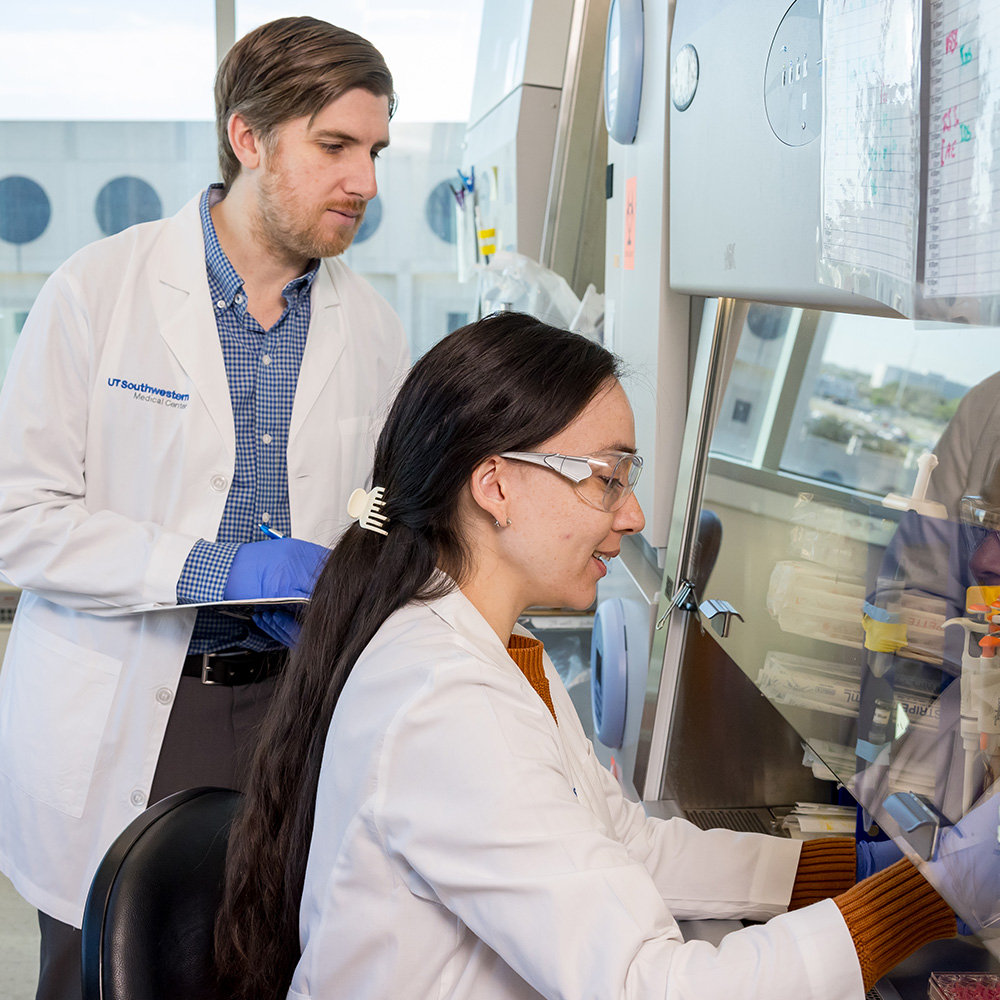20-year cancer survivor is beating a second diagnosis: pancreatic cancer

DALLAS – November 15, 2016 – Ken Abernathy is very familiar with cancer. He was diagnosed with non-Hodgkin lymphoma in 1996 and managed his slow-growing disease until 2013, when he started having pains in the side of his abdomen. A closer look revealed a devastating diagnosis – stage 4 pancreatic cancer – a diagnosis he is handling remarkably well three years later.
“I understood that we could successfully treat and manage my non-Hodgkin lymphoma,” said Mr. Abernathy, a resident of Forney, Texas, east of Dallas. “I’d been working fulltime the whole time. But I knew that with pancreatic cancer, I was in serious territory.”

Mr. Abernathy had been a regular visitor to UT Southwestern Medical Center’s Harold C. Simmons Comprehensive Cancer Center in Dallas since 2000. Now he turned to a new team of cancer experts for help.
His first oncologist, Dr. Robert Collins, Professor of Internal Medicine and leader of the Hematologic Malignancies/Blood and Marrow Transplantation Program, referred Mr. Abernathy to his colleagues who handle gastrointestinal cancers. Dr. Collins holds the Sydney and J.L. Huffines Distinguished Chair in Cancer Research in Honor of Eugene Frenkel, M.D., and the H. Lloyd and Willye V. Skaggs Professorship in Medical Research.
“We worked very closely with Dr. Collins to develop an individualized plan focused on his complex disease course with two ongoing cancers,” said Dr. Muhammad Beg, Assistant Professor of Internal Medicine, co-Director of the Gastrointestinal Cancer Team and leader for multiple pancreatic cancer trials.
While he was stage 4 at diagnosis and did not qualify for pancreatic surgery, Mr. Abernathy is managing his disease with chemotherapy called FOLFIRINOX which he receives every two weeks. Aside from some nausea the first couple of days following each treatment, he has not noticed any significant side effects.
Pancreatic cancer represents 3 percent of cancer cases diagnosed annually. Yet more people die annually from pancreatic cancer than breast cancer, an estimated 41,780 people according to the National Cancer Institute. Five year overall survival rates are currently 7.7 percent, in part because there are no effective methods of early detection. Treatment options are limited, and many patients choose to further research in the field of pancreatic cancer by volunteering for clinical trials, such as those at UT Southwestern.
PANCREATIC CANCER SYMPTOMS
Early pancreatic cancers often do not cause any signs or symptoms. By the time symptoms arise, pancreatic cancers may have spread. Having one or more of the symptoms below does not mean you have pancreatic cancer and many of these symptoms are more likely to be caused by other conditions. Still, it’s important to consult a physician so that the cause can be found and treated if needed. Symptoms may include:
- Jaundice and related symptoms
- Belly or back pain
- Weight loss and poor appetite
- Nausea and vomiting
- Gallbladder or liver enlargement
- Blood clots
- Fatty tissue abnormalities
- Diabetes
Source: American Cancer Society
UT Southwestern’s Harold C. Simmons Comprehensive Cancer Center is the only NCI-designated Comprehensive Cancer Center in North Texas and one of just 47 NCI-designated Comprehensive Cancer Centers in the nation. Simmons Cancer Center includes 13 major cancer care programs and its education and training programs support and develop the next generation of cancer researchers and clinicians. Simmons Cancer Center is among only 30 U.S. cancer research centers to be designated by the National Cancer Institute as a National Clinical Trials Network Lead Academic Participating Site.

“This case shows that each patient has a very unique disease course and we need to move forward with our best possible hand, even when faced with a devastating diagnosis. Averages posted online are just that – averages. They cannot predict individual disease courses,” said Dr. Beg, Dedman Family Scholar in Clinical Care.
“Attitude doesn’t decide your outcome, but I think it plays a role,” said Mr. Abernathy, whose energy is infectious. He’s found a new passion through a program his church recently started, which sends him to meet with newly diagnosed cancer patients. “I try to give them hope and show them how to have a good attitude.”
Now 64 and retired, Mr. Abernathy focuses much of his time on his two grandchildren.
“We go to the playground, play tag and hide and seek, and play with cars on the floor. I want my grandchildren to remember me. We don’t know how long we’re going to ride this horse, but we’re going to ride it as long as we can.”
About UT Southwestern Medical Center
UT Southwestern, one of the premier academic medical centers in the nation, integrates pioneering biomedical research with exceptional clinical care and education. The institution’s faculty includes many distinguished members, including six who have been awarded Nobel Prizes since 1985. The faculty of almost 2,800 is responsible for groundbreaking medical advances and is committed to translating science-driven research quickly to new clinical treatments. UT Southwestern physicians provide medical care in about 80 specialties to more than 100,000 hospitalized patients and oversee approximately 2.2 million outpatient visits a year.
###
Media Contact: Lori Sundeen Soderbergh
214-648-3404
lori.soderbergh@utsouthwestern.edu
To automatically receive news releases from UT Southwestern via email, subscribe at www.utsouthwestern.edu/receivenews




